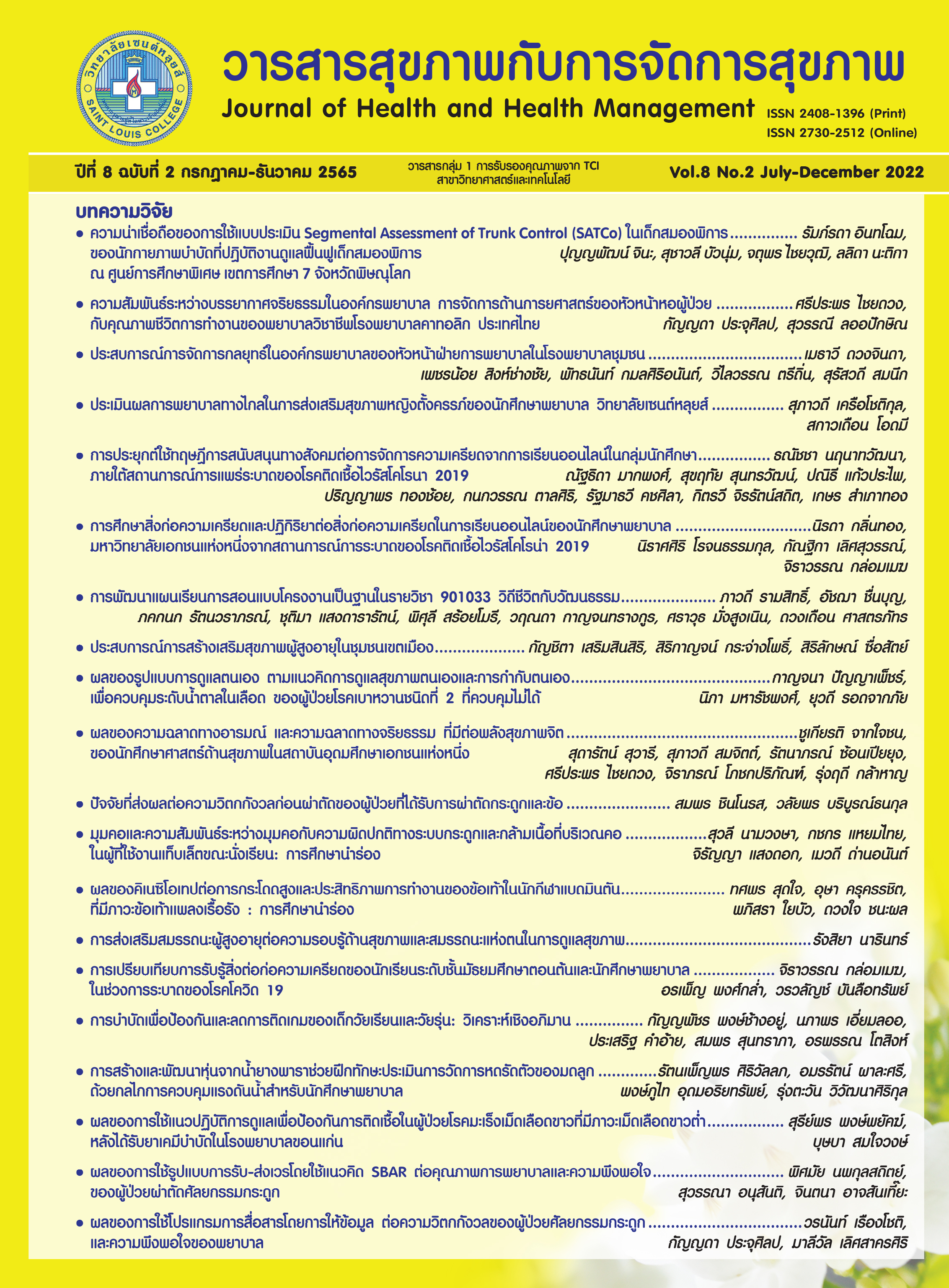Effects of Self Care Model Pertainning to Self Health Care and Self Regulation Concepts for Controlling Blood Sugar of Uncontrolled Type 2 Diabetes Mellitus Patients
Keywords:
Self Care Model, Self Regulation, Blood sugar control of Self-care behaviorAbstract
The quasi-experimental research aimed to study the effects of self care model pertainning to self health care and self regulation concepts for controlling blood sugar of uncontrolled type 2 diabetes mellitus patients at Omnoi Community Health Center, Krathum Baen District, Samut Sakhon Province. The participants were 43 patients, levels of glycosylated hemoglobin (HbA1c) at baseline equal or more than 7%, aged 35-70 years, treated by oral medicines. The participants received the program 3 month. The interview 5 questionnaire consisting 1) personal data 2) knowledge 3) self-regulation ability 4) self-care and 5) self-care behaviors to control blood sugar levels. The questionnaires were verified for content by 4 professional experts, its content of validity were 0.80, 0.83, 0.80 and 0.80. Reliability for questionnaires tested by Cronbach’s alpha coefficient were 0.73, 0.83, 0.75, 0.77 respectively. Data were collected after-intervention immediately and the follow-up period. The data were collected by questionnaires and analyzed using mean, standard deviation and one-way repeated measure ANOVA. The sample group had average.
The results revealed that the mean in knowledge scores, self-regulation ability, self-care and self-care behaviors to control blood sugar levels were significantly higher than those at before (p-value < .001). Fasting blood sugar (FBS) and glycosylated hemoglobin level (HbA1c) were significantly lower than baseline (p-value < .001). Management team of nurses or public health staff can apply the self care model to raising awareness before self-care education, retaining knowledge, self-regulation to health care behaviors appropriate for the disease by following at least 2 phone calls. By stimulating to development of 4 self-care skills including dietary, exercise, stress relaxing and medication to be appropriate according to the context of the area to controlling blood sugar levels.
References
กนกวรรณ ด้วงกลัด, ปัญญรัตน์ ลาภวงศ์วัฒนา, และณัฐกมล ชาญสาธิตพร. (2563). โปรแกรมการส่งเสริมการจัดการตนเองในผู้ป่วยเบาหวานชนิดที่ 2 ที่ควบคุมไม่ได้. วารสารวิจัยสุขภาพและการพยาบาล, 36(1), 66-83.
กองโรคไม่ติดต่อ กรมควบคุมโรค. (2563). รายงานประจำปี 2563. กรุงเทพฯ: สำนักพิมพ์อักษรกราฟฟิคแอนด์.
จันจิรา ภู่รัตน์, ปาหนัน พิชยภิญโญ และสุนีย์ ละกำปั่น. (2563). ผลของโปรแกรมการส่งเสริมการกำกับตนเองต่อการควบคุมระดับน้ำตาลในเลือดของผู้ป่วยเบาหวานชนิดที่ 2 ที่ควบคุมระดับน้ำตาลในเลือดไม่ได้. วารสารเกื้อการุณย์, 27(1), 20-33.
ฐิติพร ถนอมบุญ, พิมสุภาว์ จันทนะโสตถิ์, ขวัญใจ อำนาจสัตย์ซื่อ, และพัชราพร เกิดมงคล. (2555). การประยุกต์ใช้ทฤษฎีการดูแลตนเองของโอเรมร่วมกับการจัดการรายกรณีในการป้องกันการเกิดซ้ำของภาวะน้ำตาลในเลือดต่ำในผู้สูงอายุโรคเบาหวาน. วารสารการพยาบาลสาธารณสุข, 26(3), 94-105.
ปภัสสร กิตติพีรชล, วรรณิภา อัศวชัยสุวิกรม และสุวรรณา จันทร์ประเสริฐ. (2555). ผลของโปรแกรมกำกับตนเองต่อพฤติกรรมการออกกำลังกายแกว่งแขนและระดับน้ำตาลในเลือดของผู้ป่วยเบาหวานในชุมชน. วารสารคณะพยาบาลศาสตร์ มหาวิทยาลัยบูรพา, 20(4), 21-32.
ปรียาภรณ์ สวัสดิ์ศรี. (2555). ผลของโปรแกรมการให้ความรู้ด้านสุขภาพต่อระดับน้ำตาลในเลือดและพฤติกรรมการดูแลตนเองของผู้ป่วยเบาหวานชนิดที่ 2 โรงพยาบาลส่งเสริมสุขภาพตำบลเครือข่ายโรงพยาบาลองครักษ์ จังหวัดนครนายก. วารสารวิทยาลัยพยาบาลพระปก เกล้าจันทบุรี, 23(1), 1-14.
สมพงษ์ หามวงศ์ และพรรณี บัญชรหัตถกิจ. (2556). ผลของโปรแกรมสุขศึกษาโยประยุกต์ใช้ทฤษฎีความสามารถแห่งตนร่วมกับแรงสนับสนุนทางสังคมในผู้ป่วยเบาหวานชนิดที่ 2 ที่มารับบริการในโรงพยาบาลส่งเสริมสุขภาพตำบลบ้านหนองกุงเผือก อำเภอหนองกุงศรี จังหวัดกาฬสินธิ์. ศรีนครินทร์เวชสาร, 28(4), 451-460.
สำนักโรคไม่ติดต่อ กรมควบควบคุมโรค. (2563). รายงานประจำปีสำนักโรคไม่ติดต่อกรมควบคุมโรค กระทรวงสาธารณสุข 2562. กรุงเทพมหานคร: สำนักงานโรงพิมพ์องค์การสงเคราะห์ทหารผ่านศึกในพระบรมราชูปถัมภ์.
สำนักนโยบายและยุทธศาสตร์ กระทรวงสาธารณสุข. (2562). แผนยุทธศาสตร์กระทรวงสาธารณสุขพ.ศ. 2560 – 2564. สืบค้นจาก: http://bps.moph.go.th/new_bps/sites/default/files/strategyMOPH2019.pdf
สายใจ โพนาม. (2558). ผลของโปรแกรมการส่งเสริมสุขภาพผู้ป่วยเบาหวานตามปรัชญาเศรษฐกิจพอเพียง ตำบลฟากห้วย อำเภออรัญประเทศ จังหวัดสระแก้ว. วารสารวิจัยราชภัฏพระนคร สาขาวิทยาศาสตร์และเทคโนโลยี, 10(1), 108-130.
สุภาพร นันทศักดิ์, วนิดา ดุรงค์ฤทธิชัยและกมลทิพย์ ขลังธรรมเนียม. (2559). การพัฒนารูปแบบการดูแลผู้เป็นเบาหวานชนิดที่2ที่ควบคุมไม่ได้ได้โดยใช้แบบจำลองการดูแลผู้ป่วยเรื้อรัง ของรพ.สต.บึงสนั่น. วารสารสาธารณสุขและการพัฒนา, 14(2), 77-89.
อ้อ พรมดี, วีณา เที่ยงธรรม, และปาหนัน พิชยภิญโญ. (2559). โปรแกรมการป้องกันภาวะไตวายเรื้อรังในผู้ป่วยเบาหวานชนิดที่2 ที่ควบคุมระดับน้ำตาลในเลือดไม่ได้. วารสารพยาบาลสาธารณสุข, 30(3), 102-117.
Bandura A. (1986). Social foundations of thought and action: A social cognitive theory. Englewood Cliffs. NJ: Prentice Hall.
Turner, B. J., Liang, Y., Ramachandran, A., & Poursani, R. (2020). Telephone or visit-based community health worker care management for uncontrolled diabetes Mellitus: a longitudinal study. Journal of Community Health, 45(6), 1123-1131.
Oba, N., Barry, C. D., Gordon, S. C., & Chutipanyaporn, N. (2020). Development of a Nurse-Led Multidisciplinary Based Program to Improve Glycemic Control for People with Uncontrolled Diabetes Mellitus in a Community Hospital, Thailand. Pacific Rim International Journal of Nursing Research, 24(3), 349-362.
Orem, D. E., Taylor, S. G., & Renpenning, K. M. (2001). Nursing: Concepts of practice (6th ed.). St. Louis: Mosby
Schmidt, S. A., Lo, S., & Hollestein, L. M. (2018). Research techniques made simple: sample size estimation and power calculation. Journal of Investigative Dermatology, 138(8), 1678-1682.
Surucu, H. A., Kizilci, S., & Ergor, G. (2017). The impacts of diabetes education on self care agency, self-care activities and hbA1c levels of patients with type 2 diabetes: A randomized controlled study. Int J Caring Sci, 10(1), 479.
Downloads
Published
How to Cite
Issue
Section
License
Copyright (c) 2022 Journal of health and health management

This work is licensed under a Creative Commons Attribution-NonCommercial-NoDerivatives 4.0 International License.




